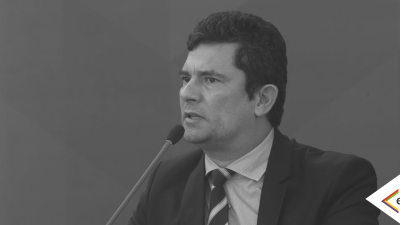Just as a soccer or football referee who handicaps one team by awarding fake penalties and fouls is a ‘juiz ladrão’* (thieving referee), former federal judge Sérgio Moro can now be deemed a thieving judge.
By three votes to two, the Second Panel of the Federal Supreme Court (STF) decided that Moro was partial and biased in the process that saw Lula da Silva convicted in the corruption case centered on the triplex apartment in the seaside town of Guarujá. This means that the entire legal process against former president Lula has now been annulled. The decisive vote was that of ‘Lava Jato’ supporter Justice Cármen Lúcia, who shifted from her previous position of December 2018, when she voted against the suspicion** of former ‘Lava-Jato’ judge Moro. Cármen Lúcia’s tiebreaking vote occurred after that of Kássio Nunes Marques, Jair Bolsonaro’s recent nominee to the Court, who voted in favor of Sérgio Moro.
The STF decision represents the harshest defeat of Operation ‘Lava Jato’ and Sérgio Moro to date. STF judges Gilmar Mendes, Ricardo Lewandowski, and Cármen Lúcia presented countless robust pieces of evidence that unequivocally demonstrated that Sérgio Moro acted in a partial and legally suspicious manner when he ordered the coercive campaign against Lula, when he illegally wiretapped the phones of family members and lawyers of the ‘petista’ (PT – Workers’ Party) leader, when he illegally leaked private conversations between Lula and Dilma to the press, and when he published details of the plea bargain struck by former Finance Minister Antonio Palocci on the eve of the second round of the 2018 presidential elections. All this and more was proof that there was a complete absence of a fair and impartial trial, the right of every Brazilian citizen under the law. It was not even necessary to turn to the criminal discussions between ‘Lava Jato’ members that were fully revealed in the Federal Police’s Operation Spoofing, which could not be used as judicial evidence against Moro because they were illegally obtained by hackers.
The determination by the Second Panel of the STF, coming as it does after the order by STF Justice Edson Fachin to annul all of Lula’s sentences in the Curitiba case, reinforces the political and legal position of Lula and places him back at the center of national politics. The recent STF decisions made by judges who supported ‘Lava Jato’, such as Edson Fachin and Cármen Lúcia, are explained by two main reasons: on the one hand, the political weakening of the Bolsonaro government in a context of the national catastrophe caused by its genocidal and denialist policy, and on the other, the public exposure of the spurious methods, practices, and objectives of ‘Lava Jato’, which have demoralized the ‘Republic of Curitiba’***.
A majority of the STF has supported Sérgio Moro and ‘Lava Jato’ lead prosecutor Deltan Dallagnol over the past five years – a period in which ‘Lava Jato’ was central to the impeachment of Dilma, the arrest of Lula, and the victory of Bolsonaro. Belatedly, the STF now seeks to politically reposition itself in the face of the unprecedented tragedy that the country is going through, and thus tries to rid itself of the responsibility that arises from this.
Moro’s suspicion proves what Party of Socialism and Freedom (PSOL) Rio de Janeiro deputy Glauber Braga said in a session of the Chamber of Deputies in 2019: Moro is a ‘juiz ladrão’ – a thieving judge – who served a reactionary project, the worst consequence of which was to bring Jair Bolsonaro to the presidential Planalto Palace. This important democratic victory has exposed Moro who, while holding the office of judge, acted as an articulator and coordinator of the political project of a coup. This should be used by the left to strengthen the struggle for the overthrow of the current genocidal government as soon as possible. Lula, now strengthened politically and morally, can and must place himself at the service of this task.
NOTES
* The term ‘juiz ladrão’ means both thieving referee and thieving judge in Brazilian Portuguese, and is a common taunt heard at football matches.
* ‘Suspeição’ (Suspicion): A legal process that challenges the independence and impartiality of a judge or other legal arbitrator, in particular their subjectivity and state of mind to preside over a matter. Only a relative presumption of partiality (juris tantum) is required for a ruling of ‘suspeição’.
*** Curitiba, the capital of the southern state of Paraná, is where Operation ‘Lava Jato’ was based.
This article is an English translation of “Moro: juiz ladrão”, Esquerda Online (EOL), 0324/2021. Translation: Bobby Sparks










Comentários